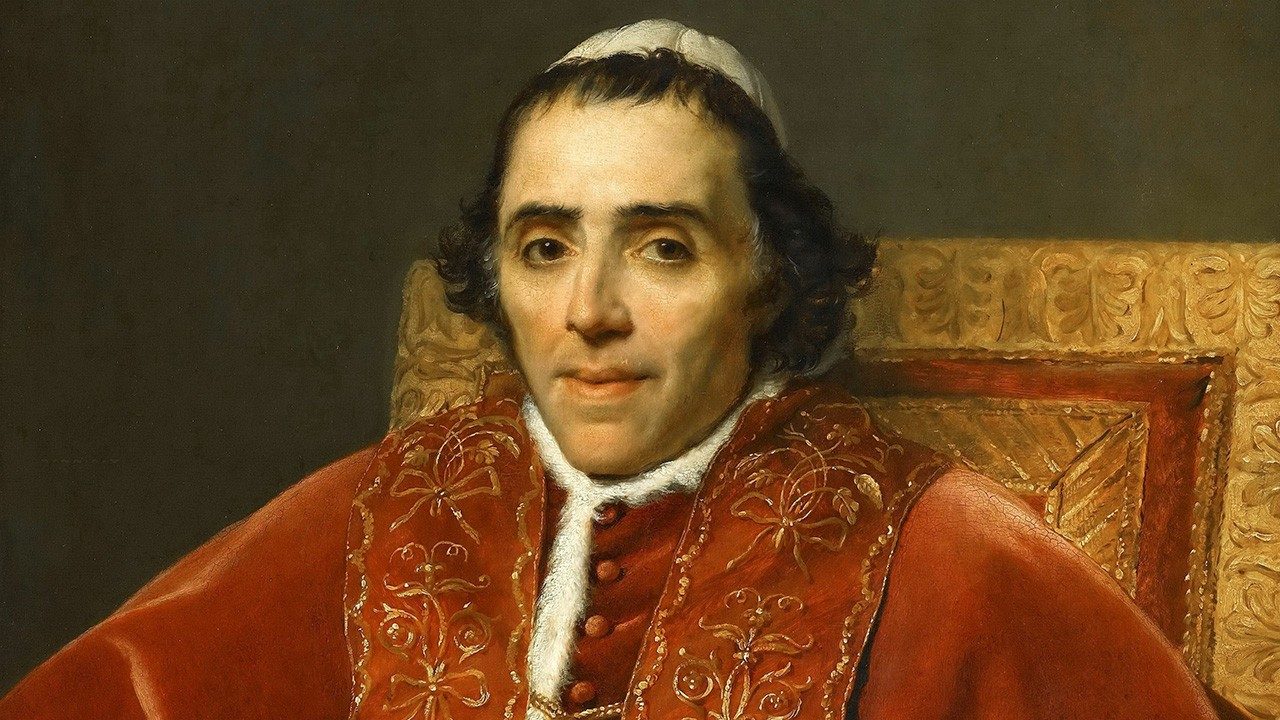Pope
Pope Pius VII
Pope Pius VII, a beacon of reform, shaped church destiny with brilliant writings and a storied life.

Discover His Story
↓
Birthdate
14 Jun 1742 (81 years)
Birthplace
Cesena, Italy
Voting Status
Voting
Position
Pope
Titular Church
San Bernardo alle Terme
Consistory
23 February 1801 by Pius VII
The Life of Pope Pius VII
The Life of Pope Pius VII
Pope Pius VII, born in 1742, was a humble servant of the Church who emerged as a beacon of faith in troubled times. His life was a testimony to unwavering devotion and resilience, even in the face of significant political and ecclesiastical challenges. He embraced his calling with a gentle yet determined spirit, demonstrating an extraordinary commitment to the unity and dignity of the Catholic faith.
1
Restoration of the Church’s Order
Pope Pius VII worked tirelessly to restore the Catholic Church after the hardships of the French Revolution and the Napoleonic era. He reorganized ecclesiastical structures and reaffirmed the Church’s traditions so that faith could flourish again. His efforts ensured that the Catholic community found stability and renewed direction in troubled times.
His pontificate was marked by several notable achievements:
- Defending Papal Authority: Even under immense pressure from secular powers, he upheld the sacred traditions and independence of the Church.
- Fostering Unity: His efforts to reconcile divisions within Christendom and support religious freedom have left an enduring legacy.
2
Reinstatement of the Society of Jesus
One of his most significant acts was the restoration of the Jesuits in 1814. By bringing back this great religious order, he not only revived a tradition of deep spiritual scholarship and missionary zeal but also strengthened the Church's intellectual and pastoral influence across the world.
The life of Pope Pius VII continues to inspire us to remain steadfast in our faith. His example calls us to trust in Divine Providence and to work for peace and unity within our community, echoing the timeless wisdom of our Holy Church.
3
Defense of the Church’s Independence
Throughout his papacy, Pope Pius VII maintained a firm stance on the autonomy of the Church. He resisted attempts by political rulers to control or influence Church affairs, ensuring that the spiritual mission remained free and untainted by worldly power. His leadership preserved the true calling of the Church and upheld its sacred traditions.
LIGHT UP YOUR HOME IN FAITH
Enhance your prayer corner and living space with our Catholic candles—each one inspired by the saints and perfected for your devotional décor.
Pope Pius VII's Writings
Restoration of the Church's Order
Pope Pius VII issued profound works that emphasized the sacred duty to rebuild the Church after years of turmoil. In these writings, he called for a return to fundamental values, restoring spiritual order and defending the Church's longstanding traditions. His commitment to guiding the faithful through difficulties remains an inspiring legacy.
Pastoral Guidance for a Renewed Faith
Through his pastoral letters, Pope Pius VII offered gentle yet resolute guidance to both clergy and laity. In these documents, he stressed the importance of trust in God's plan and the vigor of personal prayer. His words encouraged believers to embrace a life of virtue, charity, and steadfast devotion, always seeking the mercy and wisdom of the Almighty.
Encyclical on the Authority of the Church
In an era marked by tension between ecclesiastical and secular powers, the pope penned an encyclical that boldly reaffirmed the inviolable authority of the Church. This work served not only as a doctrinal statement but also as a call to unity among the faithful. It remains a touchstone for understanding the balance between earthly influence and spiritual truth.
Sermons on Divine Providence
Pope Pius VII delivered sermons that illuminated the mystery of Divine Providence, offering comfort and insight in trying times. His eloquent and simple words were designed to bring hope and clarity to all, reminding believers that every trial is part of God's loving plan. These sermons continue to inspire contemplation and trust in the divine guidance that shapes our lives.
Contemplation on a Sacred Struggle
Cardinal Spellman observed that Pope Pius VII’s conflict with Napoleon was not merely a political confrontation but a profound spiritual battle. He emphasized that the pontiff’s resolute defense of the Church’s freedom, underscored by unwavering faith, stood as a timeless testament to the supremacy of divine truth over temporal power.
Cardinal Gregory’s Reflection on Pius VII’s Reforms
Cardinal Wilton Gregory described Pope Pius VII’s reforms as a courageous renewal of the Church’s mission. He noted that these changes were not merely structural but deeply pastoral—an effort to restore the Church’s original simplicity and apostolic spirit. According to him, the reforms embodied faith, mercy, and hope, setting the stage for a revitalized ecclesial life that continues to inspire today.
Cardinal Spellman's Observation
Cardinal Spellman noted that Pope Pius VII is buried in the Vatican Grottoes beneath St. Peter’s Basilica in Rome. This sacred resting place symbolizes the profound continuity and heritage of our Church, where the legacy of faith and the service of the Holy See are lovingly preserved.